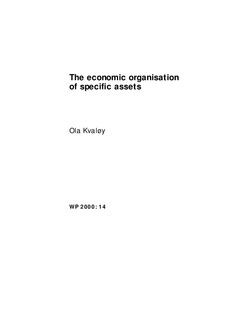| dc.contributor.author | Kvaløy, Ola | |
| dc.date.accessioned | 2008-02-27T13:23:56Z | |
| dc.date.accessioned | 2017-03-29T09:12:49Z | |
| dc.date.available | 2008-02-27T13:23:56Z | |
| dc.date.available | 2017-03-29T09:12:49Z | |
| dc.date.issued | 2000 | |
| dc.identifier.isbn | 82-90584-71-7 | |
| dc.identifier.issn | 0804-3639 | |
| dc.identifier.uri | http://hdl.handle.net/11250/2435945 | |
| dc.description.abstract | In the international offshore industry we find that the oil companies and their main suppliers usually operate with separate ownership. But the main contractors manage a capital stock, and produce inputs, that are highly specific to the oil companies. Within the traditional theory of the firm this organizational solution emerges as a puzzle. Asset specificity is usually considered as an argument for vertical integration. The idea is that integration reduces the problem of opportunistic behaviour. In this article I show that asset specificity actually can be an argument for separate ownership. While an integrated supplier considers the asset specificity as unimportant for his strategic behaviour, disintegrated parties find that a high degree of specificity makes opportunistic behaviour less profitable than if the assets enjoyed a low degree of specificity. Asset specificity can thus function as a buffer against opportunistic behaviour. This buffer can create room for strong incentive schemes. | |
| dc.language.iso | eng | |
| dc.publisher | Chr. Michelsen Institute | |
| dc.relation.ispartofseries | CMI Working paper | |
| dc.relation.ispartofseries | WP 2000: 14 | |
| dc.subject | Petroleum sector | |
| dc.subject | Relation-specific assets | |
| dc.subject | JEL: L7, L2 | |
| dc.title | The economic organisation of specific assets | |
| dc.type | Working paper | |
